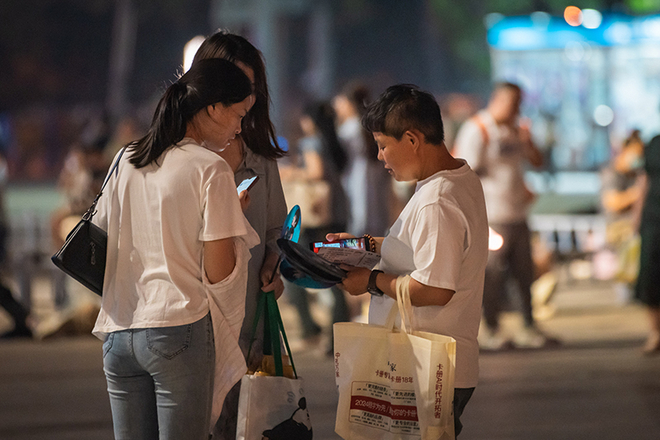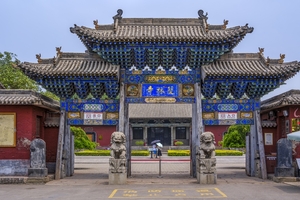How to Regulate Scalpers at Museums, Tourist Attractions and Concerts? (AI Translation)
Listen to the full version


文|财新周刊 孙嫣然 关聪 冯奕铭
By Caixin Weekly’s Sun Yanran, Guan Cong, Feng Yiming
故宫原价60元的门票,以研学、讲解服务形式加价至超过300元;原本免费的国博需加100元“讲解费”拿票;四川三星堆博物馆门票72元,加价170元才能购得……一些以“增值服务”为名、实为特殊渠道的“黄牛票”,成为暑期游客为了进入热门文旅场所的无奈选择。
The original 60-yuan ticket for the Forbidden City has been marked up to over 300 yuan under the guise of research study and explanation services. Tickets for the National Museum of China, which were originally free, now require an additional 100-yuan "explanation fee." The Sichuan Sanxingdui Museum's 72-yuan ticket is sold for an additional 170 yuan. These so-called "value-added services" are essentially scalped tickets through special channels, becoming the reluctantly accepted option for summer tourists eager to visit popular cultural and tourist attractions.
“黄牛票”来自“黄牛”,即指那些通过非法手段获取有限资源并以高价转售获利者,俗称“票贩子”,这一隐秘群体还被冠以“黄牛党”之称。“黄牛”主要有两种类型:一种主要是凭借各种内部关系资源寻租或变现;另一种是凭借恶意自动化程序等技术手段,截取线上票务资源的新型“黄牛”。
"Scalped tickets" come from "scalpers," referring to those who acquire limited resources through illegal means and resell them at high prices for profit, commonly known as "ticket scalpers." This covert group is also dubbed the "scalper gang." There are primarily two types of scalpers: one type relies on rent-seeking or cashing in on various internal relationship resources; the other employs malicious automation programs and other technical means to capture online ticket resources, representing a new breed of scalpers.
演唱会是“黄牛”聚集之地,2024年暑期,刘德华、周杰伦等明星的演唱会门票价格,被“黄牛”翻炒至近万元。财新在一个全国演出票抢票群中看到,“黄牛”提供的刘德华重庆演唱会门票价目表显示:最低980元票面价值的门票售价5600元;最高2580元的内场票则标价9800元。周杰伦南京演唱会的门票780元票面售价4300元,2000元票面售价9100元。
Concerts have become a hub for ticket scalpers. In the summer of 2024, ticket prices for concerts by stars like Andy Lau and Jay Chou were pushed by scalpers to nearly ten thousand yuan. In a national ticket-buying chat group monitored by Caixin, a scalper's price list for Andy Lau's concert in Chongqing showed: tickets with a face value of 980 yuan selling for 5,600 yuan, and the highest-priced infield tickets with a face value of 2,580 yuan marked up to 9,800 yuan. For Jay Chou's concert in Nanjing, tickets with a face value of 780 yuan were priced at 4,300 yuan, while those with a face value of 2,000 yuan were selling for 9,100 yuan.

- DIGEST HUB
- The surge in demand for museum and concert tickets has led to massive ticket scalping, with tickets being resold at highly inflated prices.
- Scalpers use advanced technologies and tactics to monopolize tickets, exploiting the imbalance between supply and demand.
- Efforts to combat scalping include law enforcement crackdowns and improving ticketing systems, yet the challenge persists due to the continuous evolution of scalping techniques.
The original 60-yuan ticket for the Forbidden City has escalated to over 300 yuan due to "research study and explanation services" [para. 1]. Similar markups are seen with tickets for the National Museum of China and the Sichuan Sanxingdui Museum [para. 1]. These escalations are the result of ticket scalping, where "scalpers" acquire tickets through illicit means and resell them at higher prices for profit [para. 2]. Scalping has infiltrated concerts significantly, pushing ticket prices for stars such as Andy Lau and Jay Chou to nearly ten thousand yuan [para. 3]. This monopolization results in "sold out in one second" becoming the norm for museums and concerts during peak seasons [para. 3]. Tencent's monitoring reveals that 80% of ticket traffic for a high-traffic museum in Beijing is from scalpers [para. 5].
The Ministry of Public Security has been combating this issue; since implementing "Category B Management" for COVID-19, they have pursued more than 900 criminal suspects and intercepted 50,000 scalper accounts [para. 6]. However, the imbalance between supply and demand exacerbates the problem [para. 8]. In the summer of 2024, ticket bookings for museums tripled pre-pandemic levels, with family groups and study tours contributing significantly [para. 10]. Despite reservations, museums like the National Museum cannot meet the overwhelming demand [para. 10]. There were 251,700 commercial performances in the first half of 2024, a 30.19% increase year-on-year, but box office revenue only increased by 13.24% [para. 11]. Concerts by artists like Andy Lau attract millions of fans, but scalpers ensure ticket prices are exorbitant, as seen with Jay Chou’s concerts [para. 13].
Industry experts note that tourist and performance sites have fixed capacity limits, and the shift of ticket sales to online platforms aids scalpers [para. 16]. Museums are trying various measures to increase supply, such as night tours and combating scalping [para. 17]. Nonetheless, the next cycle of high demand is expected [para. 18]. The "museum craze" fueled by educational travel adds to this surge [para. 19]. Museums are leveraging short video marketing to boost popularity, but their capacity to manage visitor traffic has not kept pace, largely relying on reservation systems to control flow [para. 20-21].
Some travel agencies exploit the situation by using technology or insider connections to secure and resell tickets [para. 73]. E-commerce platforms are integral to this process, as indicated by the partnership between Ctrip and the National Museum [para. 73]. Scalper detection technology is advancing, focusing on mitigating fraudulent ticket purchases through automated systems [para. 66]. Museums like the Forbidden City are implementing real-time risk identification to counteract scalping software [para. 70]. The "strict real-name" system for concert tickets mirrors this approach but involves significant investment and regional variability in implementation [para. 80].
Ticketing platforms deploy various measures to intercept scalper orders, but the high resale black-and-gray market activity remains an issue [para. 91]. The Ministry of Culture and Tourism demands increased public ticket sales and stricter real-name policies for large-scale performances [para. 89]. However, consumer rights issues persist, as seen in the Jiangsu Consumer Rights Protection Committee's discussions about refund policies [para. 97].
In summary, escalating ticket scalping in China reflects a profound supply and demand imbalance across museums and performance venues, driven further by educational travel trends. Despite ongoing efforts by museums, ticketing platforms, and law enforcement to curb scalping, the market dynamics create continuous opportunities for scalpers, requiring robust and adaptive regulatory frameworks and technological interventions to protect consumers. [para. 1][para. 2][para. 3][para. 6][para. 8][para. 10][para. 11][para. 16][para. 17][para. 18][para. 20][para. 21][para. 66][para. 70][para. 73][para. 80][para. 89][para. 91][para. 97]
- July 2023:
- The Ministry of Culture and Tourism issued the 'Notice on Further Improving the Management Level of Open Summer Tourist Attractions,' calling for optimizing reservation management and retaining offline ticket purchasing channels for special groups.
- October 2023:
- The Ministry of Public Security launched a campaign targeting ticket scalping for commercial performances, sports events, and popular scenic spots.
- As of May 2024:
- The National Museum of China saw its check-ins on the Douyin platform increase by 160.83% year-on-year.
- June 2024:
- Andy Lau sold over 30,000 tickets and attracted more than 1.2 million people online simultaneously during a ticket sale.
- June 2024:
- Shanghai maintained the policy of waiving appointment requirements for entry at over 3,000 A-level tourist attractions, art galleries, museums, and libraries.
- Summer of 2024:
- Ticket prices for concerts by stars like Andy Lau and Jay Chou were pushed by scalpers to nearly ten thousand yuan.
- From July 11, 2024 to August 31, 2024:
- The National Museum of China adjusted its opening time to begin 30 minutes earlier.
- August 2024:
- Beijing police announced the results of their summer anti-scalping operations in the travel sector, detaining 62 individuals under criminal detention and 117 under administrative detention.
- August 20, 2024 and August 22, 2024:
- Tickets for nine October 2024 performances of the ethnic dance drama 'Dream of the Red Chamber' sold out 'within a second' upon release.
- PODCAST
- MOST POPULAR





 Sign in with Google
Sign in with Google
 Sign in with Facebook
Sign in with Facebook
 Sign in with 财新
Sign in with 财新